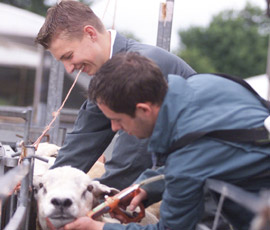DEFRA unveils strategy to attract new entrants

Farming must promote itself as a highly-skilled, professional and exciting career to attract the best talent and secure the future of the industry, a new report has recommended.
Experts in farming, business and education published a six-month review on Tuesday (9 July) into the opportunities and barriers faced by people starting careers in UK agriculture.
DEFRA’s Future of Farming Review group, launched by farm minister David Heath at the Oxford Farming Conference in January, has set out what actions they think are needed to attract new talent to careers in agriculture.
The group has set out the cultural change needed to enable forward-thinking entrepreneurs to thrive in an industry, which is modernising, innovative and embracing new technology.
The report tackles the issues that new entrants – those wishing to enter agriculture at any stage – face when selecting and starting careers in the industry.
It says the culture of the farming industry itself will need to change to secure the estimated 60,000 new entrants needed throughout the UK in agriculture and related industries during the next 10 years, if it is to remain competitive.
“The industry must take the necessary steps to ensure it can become a more professionalised, competitive and sustainable sector that in turn attracts the brightest and best,” the report recommends.
Farming must take greater responsibility for training, including business skills for new entrants to support greater professionalism, it says.
However, there are currently too many initiatives that duplicate each other, or are “too limited to deliver real and lasting change”.
The rising cost of land has made it difficult for new entrants to begin farming via the traditional route of purchasing land, the report acknowledges.
Therefore, it calls on the farming industry to work together with government to encourage local councils to “retain their farms and look for innovative ways to manage them”.
The report documents case studies of notable successful share farming initiatives and people who have worked their way up the career ladder after starting work for businesses in the agricultural sector.
But it warns that farming is perceived as a “closed shop” as evidence suggests that 84% of farmers operate in “established family farms” – and only 8% were first-generation farmers who were not from a farming background.
“This is a significant issue that can deter new entrants who are not from a farming background, but do have enthusiasm, fresh ideas and business skills,” says the report.
It calls on the farming industry to come together and demonstrate leadership, by “improving cooperation and communication between all of the initiatives”.
Other recommendations include: more advice for farmers on succession and retirement planning; better provision of affordable housing in rural areas for farmers and encouraging schoolchildren to learn more about where their food comes from.
Review chairman David Fursdon said: “We are calling for the farming industry to take more responsibility for its own future and for the government to support them in doing so.”
In response, farm minister David Heath said: “There is a wealth of career options in farming and it is vital that we are able to attract the brightest and best to fill these roles.
“To do this we need to break down some of the misconceptions and practical barriers. I will continue to work with leaders across farming, banking, business and education to promote jobs in farming and make it easier for new entrants to forge successful careers in the industry.”

